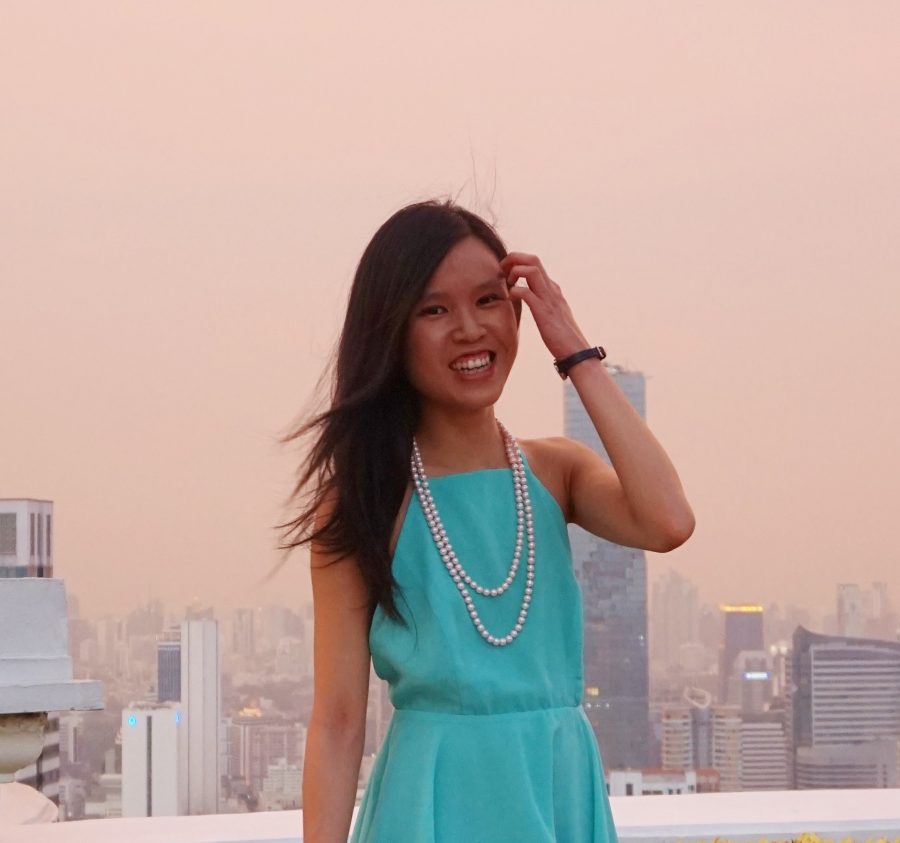Dana Ter is a freelancer for travel and in-flight magazines of airlines such as EVA Air, Hong Kong Airlines, Philippine Airlines, and SilkAir, and was previously features editor at the Taipei Times. After graduating from TAS, she completed a Master’s degree from Columbia University and the London School of Economics in world history. Dana’s work has been published in Roads & Kingdoms, Slate, Mic, and elsewhere. She has lived in 10 countries around the world.
SL: What factors helped you decide on your career? Did classes at TAS inspire you to go into journalism?
DT: I’ve always liked writing and especially enjoyed English and history classes in high school at TAS. None of the classes played a direct influence in my decision to become a journalist, though, since most of my exposure back then was mostly academic-style writing. I majored in history for both my Bachelor’s and Master’s degree, and it wasn’t until after graduate school in 2013 when I first dabbled in journalism. An acquaintance in New York was looking for new writers for Mic, an online news site targeted at a millennial audience. I started writing stories about pop culture and entertainment for them and realized that I really loved journalism. I could reach a far bigger audience by writing about such topics than writing purely academic or research papers. So I started freelancing full-time.
I know that you’ve written about TAS in your “Long way from Kabul” article: can you tell me more about the interactions you had with TAS while writing that piece? (How much contact did you have with the school, how did you find out about the students, etc.) How else has the school influenced your professional life?
The school’s alumni office actually reached out to me – the alumni community is very active here! I’ve also written an article about a North Korean refugee who spoke at TAS last year. Again, it was the school who contacted me. TAS seems to be really active in promoting causes like human rights which I think is great – it’s good for students to be cognizant of life in the real world especially since Tianmu can be a bit of an expat bubble at times. Looking back, I’m grateful for the education that TAS gave me (even though I hated the stress and workload back then!), especially in terms of honing my writing and analytical skills, but also in terms of time management and working under pressure and multitasking.
Why did you decide to work in Taiwan?
I spent my formative years in Taiwan, so I’ve always found myself drawn back here during summer and winter vacations throughout college and grad school. Before I moved back to Taipei, I was working as a freelance journalist in New York where the environment is very tough and competitive, especially when you’re just starting out in your early 20s. I visited Taipei one summer and started freelancing for the Taipei Times. It was easier to meet people and get story ideas here since I was already part of some sort of network. At the end of the summer, I was offered a full-time job at the paper so I stayed. There were just more opportunities and bigger responsibilities. If I had stayed in New York, I would probably be doing research for more senior writers, but in Taipei, I could really focus on writing what I wanted to write.
How has your writing style changed from high school? How has your writing changed from working in one country or company to another?
I can’t really remember how my writing was like in high school since that was 10 years ago. I hope it has improved! When writing an article, it’s always important to remember who your audience is. When I’m writing about Taiwan for local newspapers and magazines, for instance, there’s no need to go into detail about basic things that people living here already know, for instance, that Hualien is on the East Coast. This is really different when writing for travel magazines because you’re writing for an audience who probably doesn’t know anything about Taiwan.
What topics are you most drawn to when writing? You seem to focus on culture and lifestyle: why that area?
Yes, I am drawn to culture and lifestyle topics. I’ve never really been interested in politics – I find that it can be divisive and abstract, and I prefer to write about things that make me happy and that make other people happy. I applaud journalists who are reporting on heavy issues like Syria or racism, but it’s just not what I want to write about. The ability of soft power to change people’s minds and habits is oftentimes underestimated. To give an example, until about 5 years ago, a lot of the international media coverage about Taiwan was purely in terms of China-Taiwan relations. I’ve been trying to fill that void by talking about artists, musicians, surfers, farmers, coffee shop owners, etc. in Taiwan who are trying to make a positive change, and also to show people that Taiwan isn’t just an abstract dot on the map, but a place with a thriving place with a rich culture.


![Sofia Valadao [Erin Wu/The Blue&Gold]
Erin Wu [Annabelle Hsu/The Blue&Gold]](https://blueandgoldonline.org/wp-content/uploads/2025/05/erin-sofia-pic.png)
![Dr. Simeondis, Mr. Anderson. [Annabelle Hsu/The Blue&Gold]](https://blueandgoldonline.org/wp-content/uploads/2025/05/teachers-1200x675.jpg)
![[PHOTO COURTESY OF UNCULTURED, JUNIPER AND CO.]](https://blueandgoldonline.org/wp-content/uploads/2025/05/student-businesses-1200x675.png)
![Photo of the girl's varsity badminton team [PHOTO COURTESY OF TAS ATHLETICS]](https://blueandgoldonline.org/wp-content/uploads/2025/05/BadmintonTeam-04839-1200x675.jpg)
![The Institute for Speech and Debate, now based all across the east coast of the US. [PHOTO COURTESY OF MR. WILLIAMS]
Mr. Morris' various ceramic artwork. [PHOTO COURTESY OF MR. MORRIS]](https://blueandgoldonline.org/wp-content/uploads/2025/05/Untitled-design-1-1200x918.png)
![Mr. Castro celebrates at the finish line. [PHOTO COURTESY OF MR. CASTRO]](https://blueandgoldonline.org/wp-content/uploads/2025/04/20240513_092650124_iOS-e1745300337344-1200x1116.jpeg)